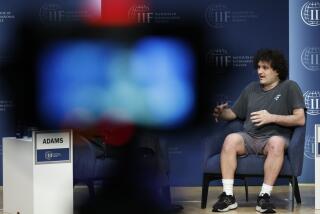Britainâs Leader Accused of Bank Scandal Negligence : Politics: Laborâs Kinnock says the crackdown should have come sooner. Major denies the charges.
LONDON â Opposition leader Neil Kinnock accused Prime Minister John Major on Tuesday of being âutterly negligentâ in not cracking down faster on the London operations of the scandal-racked Bank of Credit and Commerce International.
In their sharpest-ever exchange, Major, his voice trembling, replied that Kinnockâs remarks showed that he conducts politics âby smearâ and is âunfit to be in government.â
As their tempers flared, the House of Commons erupted in shouts, and the Speaker pleaded for order.
Kinnock, leader of the Labor Party, charged that Major had plenty of warning that the BCCI was riddled with corruption and âserious banking irregularitiesâ last year, when Major was chancellor of the exchequer, Britainâs top financial official.
But Major denied any knowledge of serious problems with the bank--which, while legally based in Luxembourg, opened branches in Britain and ran worldwide operations from London until last June 28.
The uproar over the BCCIâs closure by the Bank of England on July 5 has reached the stage of a national political and financial scandal, one that overshadows both Majorâs newly announced domestic program and his successful handling of the Group of Seven economic summit meeting in London last week.
Recent reports have indicated that British branches of the BCCI were used to move around funds by Middle East terrorists and illegal arms dealers.
Insisting that Major knew about the bankâs shady reputation and charges of drug money-laundering in January last year, Kinnock asked, âWasnât your failure to act on the knowledge you had a complete dereliction of duty?â
Majorâs inactivity, Kinnock charged, jeopardized thousands of âinnocentâ account holders who continued to use the bank.
Major, appearing to tremble, responded: âIf he is saying I am a liar, he had better say so bluntly. If he isnât, then he had better stop insinuating it.â
At the same time Tuesday, the governor of the Bank of England, Robin Leigh-Pemberton, testified before the House of Commonsâ Treasury Select Committee that although there were reports of BCCI fraud as long ago as April, 1990, the evidence was not strong enough to warrant a crackdown under British banking laws.
According to Leigh-Pemberton, it was not until a report by the accounting firm of Price Waterhouse on June 24, 1991, that fraud on the part of the BCCI management was exposed.
Had the Bank of England brought charges then, the governor said, the BCCIâs British branches might have gone under.
But after the June 24 report, he said, the Bank of England realized that âthe culture of the bank is criminalâ and had left more than 120,000 account holders in Britain, including about 60 city governments, without their deposits.
More to Read
Get the L.A. Times Politics newsletter
Deeply reported insights into legislation, politics and policy from Sacramento, Washington and beyond. In your inbox three times per week.
You may occasionally receive promotional content from the Los Angeles Times.








